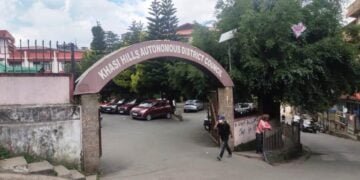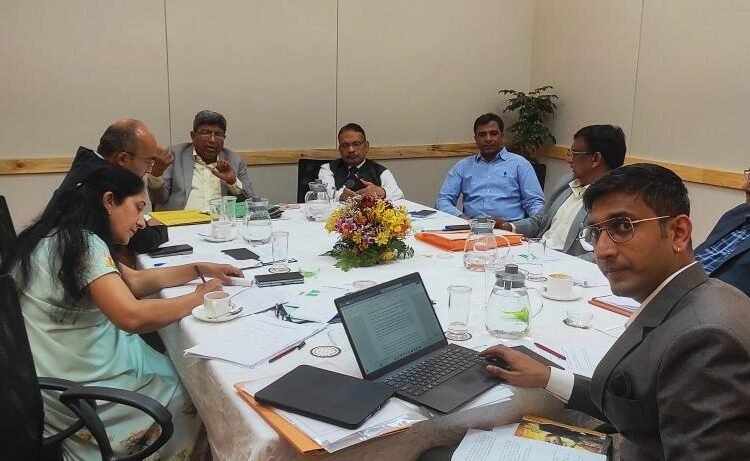The Voice of the People Party (VPP), United Democratic Party (UDP) and the Khun Hynñiewtrep National Awakening Movement (KHNAM) today made their separate submissions before the members of the expert committee on the State Reservation Policy.
While the VPP proposed that job reservation for Khasi-Jaintia, Garos, Scheduled Castes (SCs) and other Scheduled Tribes (STs) should be based in terms of their population as per the 1971 census, the UDP continues to harp on a suggestion that is “non-discriminatory and balanced.”
“This year (1971) really reflects the population of the state during that time. If you take the census of other years, there are other factors which may determine the population like birth rate and migration,” VPP spokesperson Batskhem Myrboh said.
According to Myrboh, the party also submitted its opposition, made by certain quarters, before the expert committee that reservation should not be based on population.
The VPP spokesperson also said that in 1950s, when the job reservation was brought at the all India level, 12.5 per cent was reserved for Scheduled Castes (SC) and 5 per cent for Scheduled Tribes (ST).
Later after the 1961 census, it was found out that there are 15 per cent SC in the country and therefore their reservation was raised to 15 per cent and for the ST too, the reservation was raised to 7.5 per cent. “Therefore to suggest that reservation should not be based on population is totally wrong,” he said.
Myrboh pointed out that in the country the ST are more backward than the Other Backward Class (OBCs), but according to him despite this, the centre cannot earmark more percentage in job reservation to the STs, since its population is lesser.
On arguments from certain groups that Garo Hills since its backwardness in literacy and other factors, the VPP spokesperson pointed out that there is no scientific studies done in the state to compare one tribe with the other on areas like development.
Speaking on geographical backwardness, he said that Jaintia Hills region is backward in many factors and that the Khasi Hills region, which is somewhat cosmopolitan in nature, is more developed.
“To compare geographical development and forcefully link with development or lack of it or backwardness of a particular community is not scientific at all. Therefore we are saying this argument has no basis,” Myrboh said.
The VPP Spokesperson also said that even if there was a scientific study that one tribe is less developed than the other, which will lead to sub classification of the quota policy that already exists in the State.
UDP general secretary reiterated that the party had done due diligence and consulted legal experts and academicians before coming up with the observation.
“We have put our points objectively, but at the same time, we have to ensure that it should not be discriminatory to any community in the state or create division or friction because of the reservation policy,” he added.
Mawthoh said the party suggested that the roster system should be implemented prospectively. Since there has been an increase in the ST population, then let the quota also be increased accordingly, he said.
“Let the census data guide the expert committee on how to break up the quota of different categories, population-wise in proportion but taking into consideration the inadequacy in representation,” Mawthoh said.
KHNAM proposed that the job reservation policy be based on the population structure of the Khasi-Jaintia and Garo communities respectively.
The party pointed out that as per the census of 2011 the Khasi-Jaintia communities have population that is bigger by 5, 78,918 than the Garo community and this difference is projected to rise to 9, 49,756 after the completion of the next census.
It also suggested that the word “Autonomous State” be deleted from Para 1 of the State Reservation Policy 1972.
KHNAM also pointed out that if the quota policy based on population is not possible, a combined reservation of 80 per cent should be made for all three communities (Khasi, Jaintia and Garo) which should be considered on the basis of merit.
Stating that 80 per cent reservation would avoid confrontation between the indigenous tribes of the State, the KHNAM said that this will uphold maintenance of efficiency in the administration as provided in the job reservation policy. Another of its suggestions was for 50 per cent reservation for the Khasi-Jaintia community.
Meanwhile, Nongpoh MLA Mayralborn Syiem in his submission proposed for an 80 per cent reservation to be equally distributed among all the three tribes.
He also suggested that the percentage for persons with disabilities has to be increased and also to adjust the other 5 per cent for the other categories, within the purview of the Meghalaya Public Service Commission.
Syiem further stressed that district-level jobs should be reserved exclusively for residents of the respective districts. He stated that in certain districts, there is inadequate and not up-to-the-mark representation in Grade III and Grade IV recruitment at the district level.
BJP MLA Alexander Hek Laloo suggested 50 per cent reservation for the vulnerable sections of the society in the State.
“Everybody should get justice. The job reservation policy should prioritise the vulnerable society of Khasi, Jaintia and Garo and also some percentage for the established families (of the three tribes),” he told reporters.
Pointing out that currently, the communities are entitled to 40 per cent of reservations each in state jobs, Hek suggested that the new quota should reserve 15 per cent each to the Khasi-Jaintia and Garo communities. “What is wrong as all 80 per cent will go to our own community. This will benefit the poor people of the state,” he added.
It may be mentioned that today was the last day of public hearing in Shillong, which began on October 3.
The expert committee will now hold the public hearing in Tura and Williamnagar from October 21 to 25.
The expert committee headed by Justice (Retd) Mool Chand Garg was constituted by the Meghalaya government in August 2023 for reviewing the State reservation policy.
The committee has already received hundreds of petitions containing views and opinions of people, intellectuals, political parties and civil society organisations on the matter.
























